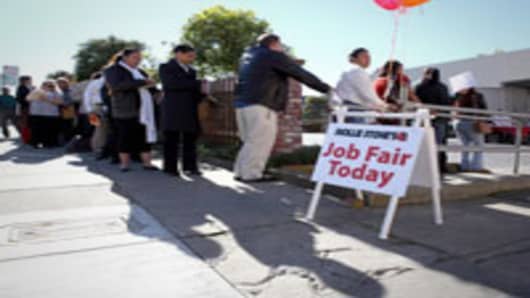June's miserable jobs report has put the fear of a double dip recession back into the markets.
The U.S. economy added a paltry 18,000 jobs in June, and the unemployment rate climbed to 9.2 percent from 9.1 percent as laid off government workers continued to join the ranks of the unemployed. There were also 44,000 fewer jobs created than previously reported for April and May.
"Even the hours worked slipped. It's just a horrific report. Unemployment going up is not good," said Marc Chandler, Brown Brothers Harriman chief currency strategist.
Stocks were battered, and bond yields slumped as investors rushed to the security of bonds. Investors also sold oil futures, which were rising before the report, and drove up the price of precious metals.
The dollar was higher but off its highs against the euro, as the single currency reacted to assurances from Italy's central bank governor Mario Draghi that Italian banks have enough capital and will pass the stress test.
"In addition to the shock value...we need to seriously question whether a double dip is there. I would say it's back on the table," said David Ader, chief Treasury strategist at CRT Capital.
Many Wall Street economists, and the Federal Reserve, have declared the slowdown in GDP growth in the first half of the year a transitory phenomena, and the weak jobs report now raised the question of whether that soft patch was softer than previously expected. The sluggishness has been blamed on a combination of things, including Japan's supply chain disruptions, high energy costsand a variety of weather disasters across the U.S.
The expectation for the June report was that 125,000 jobs would be added, which included the loss of some 20,000 government workers. Some economists had seen June as the turning point, from which job growth would increase on a monthly basis before returning to the 200,000 level later in the year.
But the report showed that the private sector added 57,000 workers, down from 73,000 in May. Government employment was cut by 39,000 workers, as state and local governments struggle with budget deficits. Revisions showed that only 25,000 jobs were added in May and 217,000 were created in April.
"From the bond market perspective, we've slowly been coming around to the idea that we've got a problem here. We've been distracted to some degree by Europe, and we thought the soft patch would give way to something firmer. That doesn't seem to be the case," said Ader. "...Some things like inflation expectations can be self-fulfilling. So can confidence in the job market."
Citigroup economist Steven Wieting, in a note, points out that the 1.5 percent GDP growth he expected for the second quarter would mean soft employment gains, but the report is at odds with the decline in weekly jobless claims; June's private sector ADP report, which showed 157,000 jobs added, and employment gains in the recent ISM manufacturing data.
Chandler said he sticks to the premise that the setback in the recovery is temporary.
"Our idea that the U.S. economy was going to recover is based on three things—lower gas prices, lower interest rates and waning of the Japanese supply chain disruptions. Those things still seem to be there. I think the problem is that many of us will see weak employment meaning weak GDP. But Q1 saw better job growth than Q4 and yet the U.S. economy weakened form Q4 to Q1," Chandler said.
The dismal jobs report also comes just days after the Federal Reserve ended its quantitative easing program, under which it purchased $600 billion in Treasury securities. The program has been credited with inflating risk assets, and was expected to keep interest rates low though rates move to lows as the program ended.
Chandler said even if market talk moves to a third easing program, or QE3, the Fed is not likely to consider it lightly.
"They have made it clear the bar is set very high," he said. Fed Chairman Ben Bernanke testifies before Congress on the economy for two days next week, and Chandler said the focus will be on whether he changes his description of the economic slowdown to something more than transitory.
Wieting, in his note, also said the third monthly increase in the unemployment rate will likely mean that policymakers will refocus their efforts on the labor market.
Ader said the poor data also puts the deficit talks in Congress in a different light.
"These deficit cutting measures that they are going to come up with...It makes this even more at risk. The fact is they're going to cut out tax loopholes and restore some taxes and cut spending...that's less money in the economy. That's a removal of stimulus," he said.
Questions? Comments? Email us at marketinsider@cnbc.com



